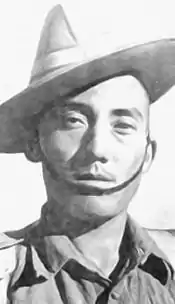Agansing Rai
Agansing Rai VC (24 April 1920 – 27 May 2000) was a Nepalese Gurkha recipient of the Victoria Cross, the highest and most prestigious award for gallantry in the face of the enemy that can be awarded to British and Commonwealth forces.
Agansing Rai VC | |
|---|---|
 | |
| Born | 24 April 1920 Amsara, Okhaldhunga district, Nepal |
| Died | 27 May 2000 (aged 80) Kathmandu, Nepal |
| Allegiance | |
| Service/ | |
| Rank | Honorary Captain |
| Unit | 5th Royal Gurkha Rifles |
| Battles/wars | World War II |
| Awards | |
Background
He was born in village development Diyale ward no 3 Aapashwara Toll, in the Okhaldhunga district of Nepal.[1]
Victoria Cross
Agansing Rai was a 24-year-old Naik in the 2nd Battalion, 5th Royal Gurkha Rifles, in the Indian Army during World War II, when he led his section in an attack on one of two posts which had been taken by the enemy and were threatening the British forces' communications on 26 June 1944 near the town of Bishenpur in the state of Manipur, India.
Under withering fire Agansing Rai and his party charged a machine-gun. Agansing Rai killed three of the crew. When the first position had been taken, he then led a dash on a machine-gun firing from the jungle, where he killed three of the crew, his men accounting for the rest. He subsequently tackled an isolated bunker single-handed, killing all four occupants. The enemy became so demoralised that they fled and the second post was recaptured.[2]
Further information
He later achieved the rank of Hon. Captain after serving in the Indian Army and died in Kathmandu. Agansing Rai's VC group were sold at auction in 2004 and now form part of the Lord Ashcroft VC collection in the Imperial War Museum in London.[3]
References
- "Telegraph Obituary". The Daily Telegraph. London. 30 May 2000. Retrieved 4 April 2013.
- "No. 36730". The London Gazette (Supplement). 3 October 1944. p. 4569.
- News Item "Agansing Rai's Victoria Cross sold at auction"
External links
- Obituary of Agansing Rai, VC, The Daily Telegraph, 30 May 2000
- Agansing Rai, VC, The Times, 30 May 2000. Retrieved on 10 October 2009.
- Agansingh Rai
- Burial location of Agansing Rai "Nepal"